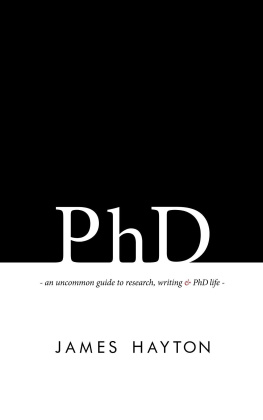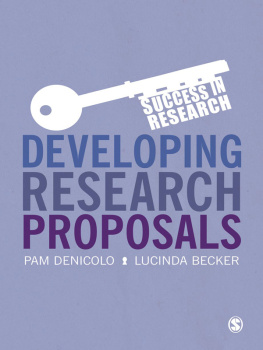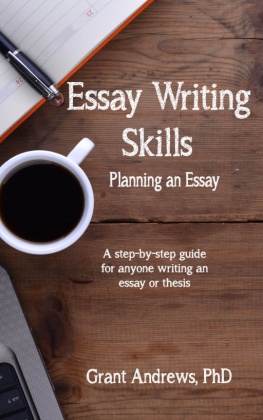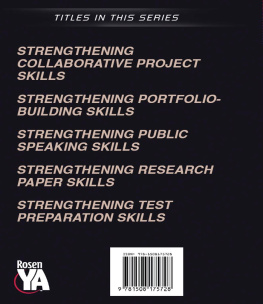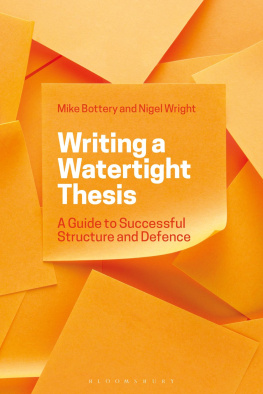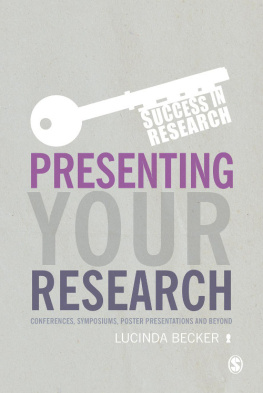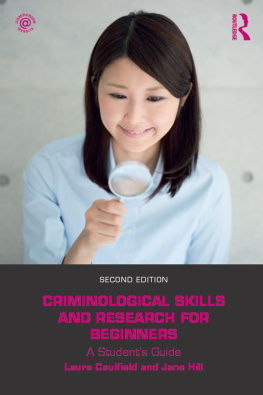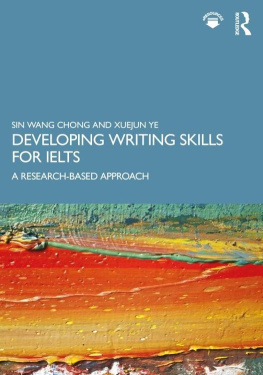PhD: An uncommon guide to research, writing & PhD life
By James Hayton
Published by James Hayton PhD
Copyright 2015 James Hayton
All rights reserved. No part of this book may be reproduced in any form or by any means without permission from the publisher.
ISBN: 978-0-9931741-2-4 (Kindle Edition)
Contents
BECAUSE I LOVE DOING RESEARCH
In 2002, shortly after graduating from my bachelors degree in physics from the University of Sheffield, I took a job with an insurance company. From a practical point of view it was a good decision; the job offered a decent starting salary and there were good prospects for promotion within a large organisation.
I hadnt even considered staying in academia. My grades had been below average, primarily because I didnt work very hard in the first two years, so it had never occurred to me that I would be allowed to continue. Not knowing what I really wanted to do, I just applied for anything available.
Partway through my application process for the insurance job, I heard about a masters programme in nanoscale science and technology starting that September. I dont know why I applied; I didnt expect to get in, but remarkably, crazily, I was offered a place provided I could pay the tuition fees. I couldnt, so I figured Id take the insurance job and maybe save some money and think about doing the masters degree later. This was a sensible plan, but just two weeks after starting the job I received an email telling me that some funding had become available and that I could start the course immediately without having to pay tuition.
Rationally, I should have said no; I was two weeks into a new job that would allow me to pay off my student debt and start to build a secure, comfortable life. But there was something a deep, inexplicable compulsion that made me quit the job and sign up for the Masters degree. I spent maybe twenty minutes thinking about a decision that changed the rest of my life. I still didnt know what I wanted to do with my life, but two weeks was enough to know that I definitely didnt want to work in insurance.
The masters course lasted for a year, and the natural progression seemed to be to do a PhD. Again, I didnt think I could get in anywhere because of my undergraduate grades, but I applied to a few places anyway.
One of my applications was to the University of Nottingham, where I had two interviews, as there were two supervisors looking for students. I went into the first interview, sat down, and the professor on the other side of the desk cut straight to the point with the question, so why do you want to do a PhD?
In truth, I didnt really know why. I guess I wanted to do it partly for the challenge, but also partly because I liked the idea of doing something so few people were able to do, partly because I liked the idea of contributing something new, partly to compensate for the fact that I hadnt done very well as an undergraduate, partly because I didnt want to go back to selling insurance, but mainly because of that inexplicable compulsion; once I got the idea in my head, I just had to try.
I didnt say any of this; instead I gave some vague, incoherent and not-very-confident answer, to which he frowned slightly and replied, well, the best reason to do a PhD is because you love doing research.
If only Id thought of saying that! I did love doing research, but it was too late to say so once hed given me the answer. The interview continued, but I knew Id blown it.
Fortunately, I had another chance. I went into the second interview, sat down, and after a few minutes he asked, so why do you want to do a PhD?
I replied, because I love doing research. He smiled, the rest of the interview ran smoothly, and I was formally offered a place a few days later.
I had been accepted! After my lazy performance at undergraduate level I had a second chance to prove what I was really capable of.
I started my PhD in September 2003, but it wasnt long before I realised that it is much, much easier to get into a PhD programme than it is to complete one.
THE BEST OF THE BEST?
On the very first day of my PhD, there was an induction event for all the new PhD students in the department, with talks from various staff members. Many of them covered administrative matters, safety procedures and the like, but one talk in particular stands out in my memory.
In what was intended to be a confidence-boosting speech, we were told that we were the best of the best and thats why we had been admitted to a PhD programme at one of the top-ranked universities in the country. Although it was supposed to be encouraging, for me it had the opposite effect. In every measurable sense, I wasnt the best of the best. The others probably were, but I was the guy who had bluffed his way in. My confidence wasnt shattered, but there was just the slightest hint of a thought at the back of my mind that maybe I didnt deserve to be there.
But are PhD students really the best of the best? At first glance it seems to make sense; after all, a PhD is the highest-level academic qualification you can attempt, and it is generally only those who have done exceptionally well at previous stages of their education who are accepted into PhD programmes.
The pinnacle of the education system
If we say that PhD students are the best of the best, then we can imagine the various levels of the education system as a pyramid, with primary education at the bottom and a PhD at the top. On completion of each level, only the best move up (if they choose to); so each level has fewer students than the last, and only a small percentage of the population reach the level of a PhD.
There is a problem though with thinking of a PhD as the pinnacle of the education system. Throughout the lower levels, there is a certain consistency in the way courses are taught and examined, with a set structure, syllabus and timetable for you and your classmates to follow. You are presented with the same information as everybody else in your class, and you all take the same test at the same time.
As you move up from one level to the next, the material may get more difficult and your studies more specialised, but the basic system stays more-or-less the same.
But when you reach PhD level, in almost every respect the system is not only different but the exact opposite of what you are accustomed to. There is no set structure, no set syllabus and no set timetable. You will not be told what to learn and when, and you will not take a standardised exam with set questions you can revise for.
Because of these differences, we cant think of a PhD as being simply a progression from previous studies. It is a different system, unlike anything you have done before, and it requires different skills to the ones that got you this far.
Entering the world of professional academia
Instead of thinking of a PhD as the pinnacle of the education system, its better to think of it as the bottom layer of the professional academic system.
Of the students who complete a PhD, some leave academia, some go on to post-doctoral research positions. Of these, some leave, some go on to other temporary positions, some become permanent research or teaching staff, and so on.
Because there are more students graduating with PhDs than there are academic posts being created or vacated, each level has fewer people than the last. This creates a fierce competition for places, where (in principle at least) only the best move up or survive.
A PhD is the entrance qualification to this world of professional academia. It is a period of training to help you develop the skills required to conduct research to a professional academic level.
Of course there are other ways to define it; you could say that a PhD is an original contribution to the body of knowledge, to give just one common example. This is true, in that you will need to make an original research contribution, but the reason why you need to make that contribution is to demonstrate that you can conduct research to a professional level.
Next page
